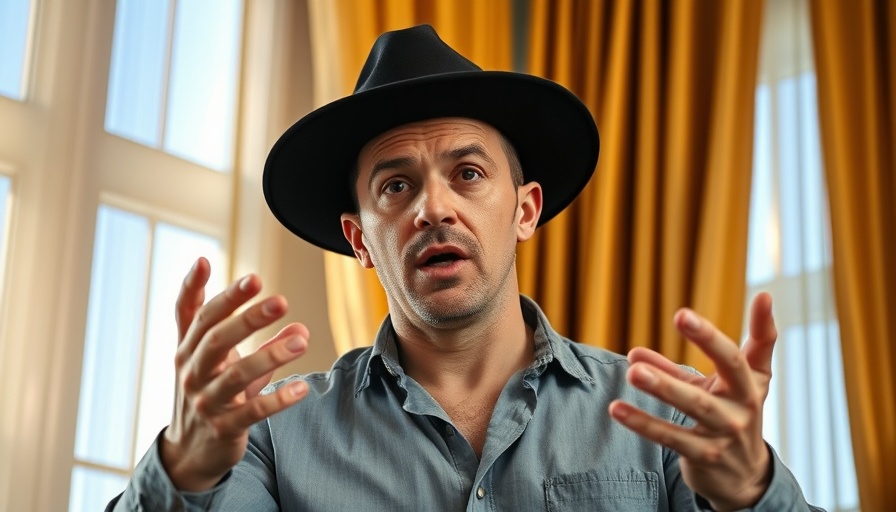
Elon Musk's DOGE Leadership and Constitutional Integrity: What's at Stake?
In a groundbreaking opinion, a federal judge has ruled that Elon Musk’s role with the Department of Government Efficiency (DOGE) likely constitutes a violation of the U.S. Constitution's appointments clause. This controversial position has raised alarms about the implications of Musk's unprecedented influence over federal agencies, especially the critically important U.S. Agency for International Development (USAID).
The Constitutional Concerns Behind Musk’s Leadership
Judge Theodore Chuang, who presides over the U.S. District Court for the District of Maryland, meticulously argued that substantial evidence suggests Musk effectively serves as the de facto head of DOGE. Despite the government's classification of him as merely a "special advisor," statements made by Musk and actions taken since President Trump’s administration have betrayed a much different reality. Chuang emphasized that Musk has indeed exercised authority typical of a formally appointed officer, thereby infringing upon constitutional protocols designed to ensure that significant federal officials undergo a proper vetting process.
Reinstating Agency Operations: A Judicial Pushback
The judge’s ruling comes within a context of escalating actions taken by Musk, including attempts to shutter USAID. Chuang's latest opinion ordered a partial restoration of the agency's functions, demanding that employees regain access to essential email systems and workspace prior to the drastic measures initiated by DOGE. Chuang's insistence on restoration illustrates significant betrayal, as it deprives Congress of its constitutional authority to oversee the federal government. With the judge's injunction in place, there is a renewed call for accountability and clarity around Musk’s involvement, igniting a broader debate on executive power.
Public Sentiment: Concerns Regarding Executive Overreach
Musk’s attempts to camouflage his actions under the guise of modernization have infused public discourse with skepticism and fear about executive overreach. Many see this as an attempt to diminish the fundamental role Congress plays in federal governance, violating the core principles of the separation of powers. Public backlash and growing scrutiny have led to calls for reforms that would prevent individuals in similar positions from wielding unchecked authority over key government operations.
Future Implications: A Shaping Moment in American Governance?
The implications of this ruling extend beyond merely Musk’s actions. The judge’s perspective opens up critical conversations about governance and accountability in a digital age where influential figures can wield tremendous sway over governmental structures. Legal experts are weighing in on the potential precedents this case could set for future regulatory frameworks surrounding technology industry leaders and their interactions with government. Will greater scrutiny follow for those who wish to merge private enterprise with public authority?
Diverse Perspectives on Executive Roles in Government
Reactions to the ruling have been mixed, with some legal analysts praising Judge Chuang’s decision as a vital safeguard for constitutional integrity, while others argue it places an undue burden on the already strained resources of federal agencies. Echoing the sentiments shared by legal advocates, past executive actions raise flags about the appropriateness of appointing business leaders to governmental roles without thorough confirmation processes. As public trust becomes more critical, the question remains: how can we navigate the crossroads of innovation and legality without compromising judicial integrity?
What’s Next for Musk and DOGE?
As the dust settles from this landmark opinion, Musk and the DOGE team face uncertainty about how to proceed. With signs of unrest from the public and judicial branches alike, the ramifications of their actions may shape the narrative surrounding leadership within the government. Will Musk heed the court's ruling, or further challenge the decision in an escalating legal battle involving essential services for millions of Americans?
This ongoing situation sheds light on important parallels with corporate governance in a time of rapid technological change. Various stakeholders now have a vested interest in seeing how this dynamic unfolds, potentially laying the groundwork for future battles over the relationship between government and private industry.
As conversations continue, it’s essential for citizens to remain informed and engaged in issues concerning the governance of their country. Following the developments related to DOGE and USAID will illuminate not only Musk's trajectory but also the future path of public accountability and responsible leadership.
Stay updated on breaking tech news and the tech industry by following our coverage.
 Add Row
Add Row  Add
Add 



Write A Comment